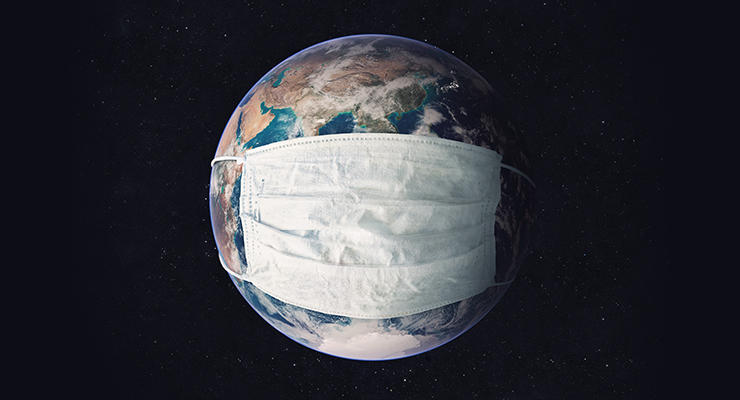By Sean Moloughney, Editor09.09.21
In August, a United Nations report presented a stark reality about the effects of climate change. “Human influence has warmed the climate at a rate that is unprecedented in at least the last 2,000 years,” the report from scientists at the Intergovernmental Panel on Climate Change (IPCC) said. “Human-induced climate change is already affecting many weather and climate extremes in every region across the globe.”
Scenes from this summer appeared to be direct evidence of that: intense heat waves and drought in the U.S. and Canada; raging wildfires in Turkey, Greece, and Siberia; devastating flooding in Germany, China, and the U.S. This is only the beginning, according to the report.
Humans have already heated the planet by about 1.1 degrees Celsius, or 2 degrees Fahrenheit, since the 19th century. Even if countries cut emissions drastically today, total warming is still likely to rise around 1.5 degrees Celsius within the next two decades. With that change essentially locked in, future heat waves, severe droughts, and intense storms are inevitable.
More animal and plant species will be lost. Coral reefs that sustain fisheries will collapse. It’s an ugly and painful wake-up call for humanity. “Many changes due to past and future greenhouse gas emissions are irreversible for centuries to millennia, especially changes in the ocean, ice sheets and global sea level,” the report said.
There are still opportunities to mitigate the severity of the effects, and hopefully stave off the worst possible future scenarios. But countries need to act now and work together, the report said. Unfortunately, like clear scientific evidence in other disciplines today, climate change has been challenged and denied for too long. And we’ll continue to deal with the effects of that in the future.
July of 2021 was officially declared the planet’s hottest month ever recorded, according to global data from the National Oceanic and Atmospheric Administration’s (NOAA) National Centers for Environmental Information. At this rate, I don’t expect that record to stand for too many summers.
Our September issue features lengthy discussion of sustainability topics, from oceans to plants to packaging. At the same time, many experts have connected stress to unhealthy lifestyle habits that can often lead to weight gain. I see common threads between the stress of modern living today and the collective health of humanity, and our planet.
I don’t know if the U.N. report will serve as a wake-up call for anyone who wasn’t already aware of the situation, but it’s still important subject matter to review.
What’s your sustainability story? We at Nutraceuticals World would be happy to hear it.
Sean Moloughney has been the Editor of Nutraceuticals World since 2012. He can be reached at SMoloughney@RodmanMedia.com.
Scenes from this summer appeared to be direct evidence of that: intense heat waves and drought in the U.S. and Canada; raging wildfires in Turkey, Greece, and Siberia; devastating flooding in Germany, China, and the U.S. This is only the beginning, according to the report.
Humans have already heated the planet by about 1.1 degrees Celsius, or 2 degrees Fahrenheit, since the 19th century. Even if countries cut emissions drastically today, total warming is still likely to rise around 1.5 degrees Celsius within the next two decades. With that change essentially locked in, future heat waves, severe droughts, and intense storms are inevitable.
More animal and plant species will be lost. Coral reefs that sustain fisheries will collapse. It’s an ugly and painful wake-up call for humanity. “Many changes due to past and future greenhouse gas emissions are irreversible for centuries to millennia, especially changes in the ocean, ice sheets and global sea level,” the report said.
There are still opportunities to mitigate the severity of the effects, and hopefully stave off the worst possible future scenarios. But countries need to act now and work together, the report said. Unfortunately, like clear scientific evidence in other disciplines today, climate change has been challenged and denied for too long. And we’ll continue to deal with the effects of that in the future.
July of 2021 was officially declared the planet’s hottest month ever recorded, according to global data from the National Oceanic and Atmospheric Administration’s (NOAA) National Centers for Environmental Information. At this rate, I don’t expect that record to stand for too many summers.
Our September issue features lengthy discussion of sustainability topics, from oceans to plants to packaging. At the same time, many experts have connected stress to unhealthy lifestyle habits that can often lead to weight gain. I see common threads between the stress of modern living today and the collective health of humanity, and our planet.
I don’t know if the U.N. report will serve as a wake-up call for anyone who wasn’t already aware of the situation, but it’s still important subject matter to review.
What’s your sustainability story? We at Nutraceuticals World would be happy to hear it.
Sean Moloughney has been the Editor of Nutraceuticals World since 2012. He can be reached at SMoloughney@RodmanMedia.com.




























